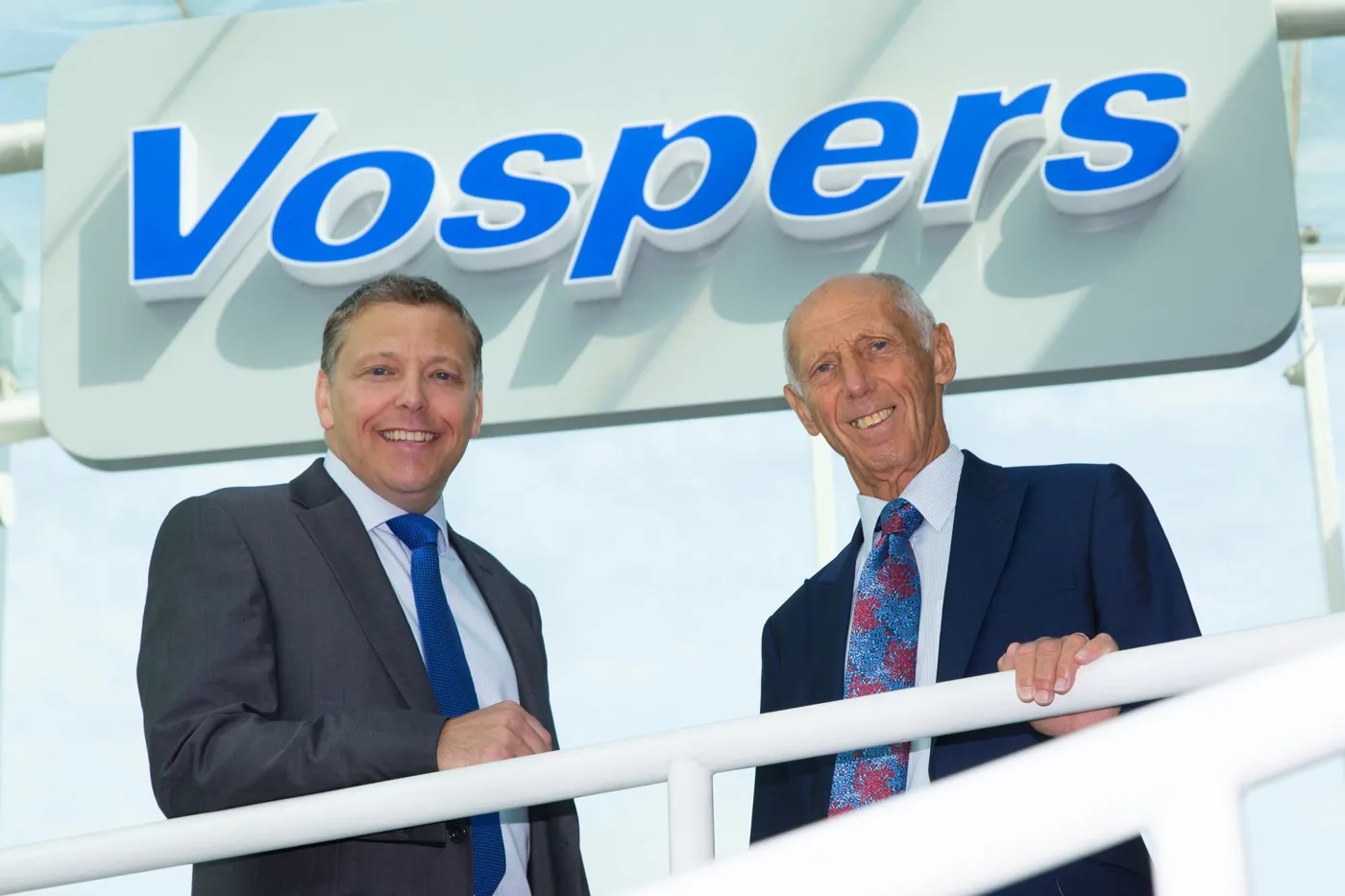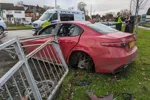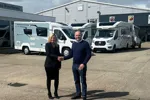It is in the nature of a franchise contract that it puts most of the power in the hands of vehicle manufacturers – the relationship with the brand is critical. Yet dealer groups are able to carve out their own success with focus, determination and a willingness to test new ideas and concepts. No business leader can afford to sit on their hands and expect it to be ‘business as usual’ in this century-old industry.
> > VOSPERS
Turnover: £234m (2016)
Profit before tax £2.7m (2016)
Franchises Ford (8), Ford LCV (3), Fiat (4), Fiat LCV (3), Mazda (3), Nissan (2), Renault/Dacia (2), Jeep (2), Peugeot (2), Peugeot LCV (1), Alfa Romeo (2), Seat (1), Abarth (1)
Number of staff 730
New car sales 6,686 (2016)
Used car sales 5,532 (2016)
“We have to adapt and change as a business. We need to add value. The franchised dealer needs to deliver exceptional service, above and beyond what an independent would probably deliver,” said Nick Vosper, the managing director of Vospers Motor House, the AM100 group founded by his grandfather and now chaired by his father, Peter Vosper.
The family-owned dealer group has heritage – it has been in business since 1946. Over the decades it has become a well recognised brand across Devon and Cornwall, where it operates 14 car and LCV dealerships, three rental depots and two accident repair centres. With 730 staff, it is among the 20 largest employers in the region, so the Vosper family understands that heritage needs careful management. As the motor retail industry faces rapid evolution in the next decade, motor retail will likely need new strategies and models, and the group has to be well positioned to thrive.
Nick Vosper has worked in the group since 1996, but took some time out to complete an MBA (Masters in business administration) at Exeter University before taking the managing director role in 2011. Guided by his example, Vospers has since encouraged – and fully funded – part-time MBA study for a number of its other senior team members, including contact and communications director Mark Haslam, financial director Paul Rogers and group accountant Mike Taylor. In addition to Nick’s MBA, Peter Vosper recently received an honorary doctor of business degree from Plymouth University in recognition of his business expertise.
Vospers believes it is invaluable to have the skills and abilities to step back from day-to-day pressures and to consider strategic elements.
“If they’re doing their job day-to-day, they don’t get challenged on the macroeconomic basis. They don’t see the external factors that can influence the business, Brexit for example. If you don’t get challenged in that way, you’re not ready for change. I think the MBA training stretches you in a different way,” said Nick.
“After they have been through the process, they are different people. It’s fantastic to see. We want them to look beyond the motor trade, to learn about other industries, to learn a framework with regards to strategic management and financial management.”
Peter Vosper added that dealer group management teams are under considerable pressure, because with the slim profit margins available, a business has to get it right. With talk of new mobility solutions and electric or hydrogen powertrains being part of automotive’s future, he is conscious that its service business – traditionally a strong source of profits – may be radically different by 2030.
He and Nick have changed the group considerably in the past 20 years, turning an operation which was wholly dependent on Ford for three decades into a multi-brand motor retailer, with Italian, French and Japanese mainstream brands in multiple locations. They are convinced that the future will demand a certain scale of motor retailer, able to derive efficiencies from larger sales and service operations and with the capacity to test new ideas on a small scale without upsetting the overall performance.
One such test involved Vospers’ Marsh Mills Motor Park in Plymouth. It is a huge site and home to Ford, Nissan, Renault/Dacia, Peugeot, Mazda, Seat, Fiat, Jeep and Alfa Romeo new car sales and service franchises. Its workshop is shared by all the brands, with brand-specific technicians, and in 2011 Vospers brought all the brands’ service reception desks into one large space, with a single customer lounge with Wi-Fi and refreshments.
While it appeared to be an efficient way of working, the group found that customers don’t like it – some likened it to an airport lounge. There were also no front-end savings, as they still required receptionists for each brand. Gradually the positions have been reintroduced into the respective brands’ showrooms.
“We have always been prepared to do things. We don’t always get it right,” said Peter Vosper. “Not every one of our customers thinks it doesn’t work, but the majority prefer to go through the door of the brand that they purchased.”
Nick Vosper added: “The brand experience is important to me in my own consumerism, so I do think that it is important to a lot of our customers.”
That long-established Vospers brand carries a lot of weight too. It is a large business in the south-west, but it highlights to consumers that it is family-owned, and that members of the family are actively involved in its day-to-day running. Peter and Nick remain heavily involved in local causes and sponsorships as the faces of the business, and loyal customers will occasionally ring up requesting to speak with “Mr Vosper” directly and do get through to Nick or Peter.
Peter said: “We want people to look on us as being a good business that solves their motoring problems. You’re representing your business. It’s amazing to me that I’ll be in Sainsbury’s and someone will come up and have a conversation with me. I wouldn’t be enjoying it if people were to come up and tell me what a useless business I had, but people are happy.”
Nick added: “Our customers have been buying vehicles from us for over 70 years and I think that means something.”
Both believe the leaders of the business should be open and approachable when it comes to staff relationships too. Since the group has grown in scale, it has become impossible for the directors to know every employee. However, they frequently visit each dealership to speak to employees, to find out about any issues on the ground, and to reward long service. Each December, the Vospers write more than 700 Christmas cards to employees. After the March campaign, Nick Vosper wrote 25 personal thank-you cards to managers.
Those little personal touches, acts of recognition, demonstrate how Vospers wants staff to feel the benefits of a family business. Honesty and integrity are important to the family, and Nick and Peter are confident that employees know they can raise any issues or make any suggestions without fear.
Exit interviews with leavers have highlighted two aspects of employment that trouble them – the desire for more flexible working in sales, to accommodate their home lives, and for a higher basic salary that will help them get on the housing ladder. The motor retail industry as a whole is facing these issues, but Vospers plans to examine them more closely in the future.
Nick Vosper said: “I see people at the school gates because I have a young daughter, and just chatting with the men there shows how the dynamic is changing. If we don’t change, I don’t think we will get a diverse culture within the business, and then the people that are buying from us won’t have any empathy. We need some empathy in our line of business.”
Property is a crucial part of Vospers' sustainability
Nick Vosper said: “To be fair, we’re changing all the time, and you’ve got to have the profitability in the model to be able to do that. As an industry, we have to aspire to more than 1.1% or 1.2% return on turnover. With the investment that is required today, it is not really a sustainable model.”
Since 2010, Vospers has spent about £3m refurbishing the Marsh Mills site, and it is now investing more than £12m in a FordStore in Exeter on a 9.5-acre piece of land that provides space for expansion or other ventures.
Nick Vosper believes such developments are not to satisfy manufacturers’ demand for ‘palaces’, as some suggest, but will really provide what customers want – updated facilities and as many cars on display as possible. He’s supportive of such developments, but with the caveat that manufacturers must allow dealers to make more profit. He suggested that for family-run dealer groups, property is a crucial element of sustainability. It’s a point his father elaborates – dealers with freehold property are able to adapt, to reformat, without concerns that there is a landlord who will have to raise the rent to recoup their own investment. In the past, dealers have benefited from selling old sites to supermarket chains as their showrooms relocate and expand.
To that end, Vospers owns a 16-acre piece of land in the northern part of Plymouth, for any future development needs. Asked about the possibility of buying and leasing property operated by other motor retailers, Peter Vosper makes his lack of interest clear: “We haven’t ever done that. I think we would then become more of a property company than a motor dealer.”
The group’s return on sales has hovered around 1.1% to 1.2% for the past two years. It aspires to 1.3% this year, and Peter Vosper has discussed with Ford the need for a “road to 2%”.
Vospers will consolidate some of its other businesses in Cornwall, starting with the closure of Tiverton earlier this year. This will reduce the group’s overheads, plus the management team expects sales and customer experience to improve. Its smallest sites have a three-car showroom and only one sales executive. If that executive goes on holiday, someone is moved across from another branch. Such practices don’t feature in Vospers’ vision for the future of larger ‘hubs’.
“When we talk about technology and the way that the business is moving, we cannot deliver an experience in a really small showroom in a small market area,” said Nick Vosper.
What does feature, however, is trials of new working methods. Several years ago, the group introduced two shifts at its bodyshops, each of four days on and four off, to increase capacity through using the facilities seven days per week. Now the group plans to trial it in a service workshop. Success is not guaranteed – Peter Vosper pointed out that a crucial element of its success at
bodyshops is that the business controls the process and the customer generally doesn’t expect an appointment and return of the car within the same day, as they do with servicing.
Extra capacity is also being released through mobile servicing, with three vans and technicians serving the region, and the Exeter FordStore will include four ‘lean servicing’ Express Service bays in addition to the standard work bays. Each express bay has two technicians who will aim to complete a service within 41 minutes. If the car also requires brake work, the whole process is completed in an hour.
It requires careful screening at the booking stage to identify the cars most suited to Express Service, because any that need investigation of other maintenance issues would delay the process. However, it could benefit the business as well as the customer, as it avoids the need for a courtesy car.
“We do feel that customers want to be able to enjoy the experience and that means being able to park easily, seeing a big display of demonstrators, servicing at their convenience and offering new facilities like Express Service,” said Nick Vosper.
Vospers plans new web platform and online sales
Nick Vosper described the group as being “behind slightly” with its digital strategy, but said major changes are ahead.
Its used-car platform is mobile- and tablet- enabled, and the next stage will be to bring in a completely new platform for the group website, then developing an online car purchase facility.
It already has a parts and accessories e-commerce portal, powered by a system called Magento, which is forecast to achieve £1m of sales this year, with orders from as far away as Barbados. It offers insight to Vospers’ physical showrooms too, as the company has identified that a proportion of Magento’s users have bought cars from the group, but clearly were not sold the accessories they desired while still in the showroom.
Consequently, it has analysed the top-selling lines, and conducts specific parts marketing meetings to determine what offers to promote.
“All our showrooms have cars dressed in accessories. You also have to make sure the customer understands that you are competitive, because the perception is always that it will be cheaper at Halfords,” said Peter Vosper.
Nick Vosper and parts director Bob Foster are trying to find a way to better fit accessories into the sales process. Vosper is keenly aware that the sales teams already have other products to sell, such as GAP, and that there is a danger of giving the customer “battle fatigue” by the end of the process.
One solution they are considering is an element added at the end of the sale, which gives the customer the opportunity to buy there and then, but also introduces them to the e-commerce portal for deferred purchases. Some customers won’t consider what else they need until after they have bought their car, and Nick Vosper doesn’t want them going to Halfords.
The group has always taken trade parts seriously, and its sales of components to independent workshops in the region generates about £25m per year. It supports its field sales representatives and delivery vans – which call on clients two to five times daily – with three professional contact centres at Truro, Plymouth and Exeter, which help to generate sales and ensure customers are satisfied.
One of the issues that Vospers identified with digital retailing is that the dealer is forced to go outside the DMS to get some of what it needs. Integration by the DMS companies seems to move slowly, particularly with APIs (application programming interfaces) such as consumer finance solutions. Nick added: “Being able to sign on an iPad is really where it should be. The systems in this industry are a little bit archaic.
“In the future, we need to be in charge of our data, and we also need to be better at managing customers’ data and using it more effectively in our customer journey rather than bombarding them with offers from all our different departments.”


















Roger Rowlett - 04/12/2017 17:30
Sorry vospers its not up to the manufacturers to provide the ROS there are many dealer groups making 2% and more now however the key element that provides the holy grail in ROS is franchise mix.